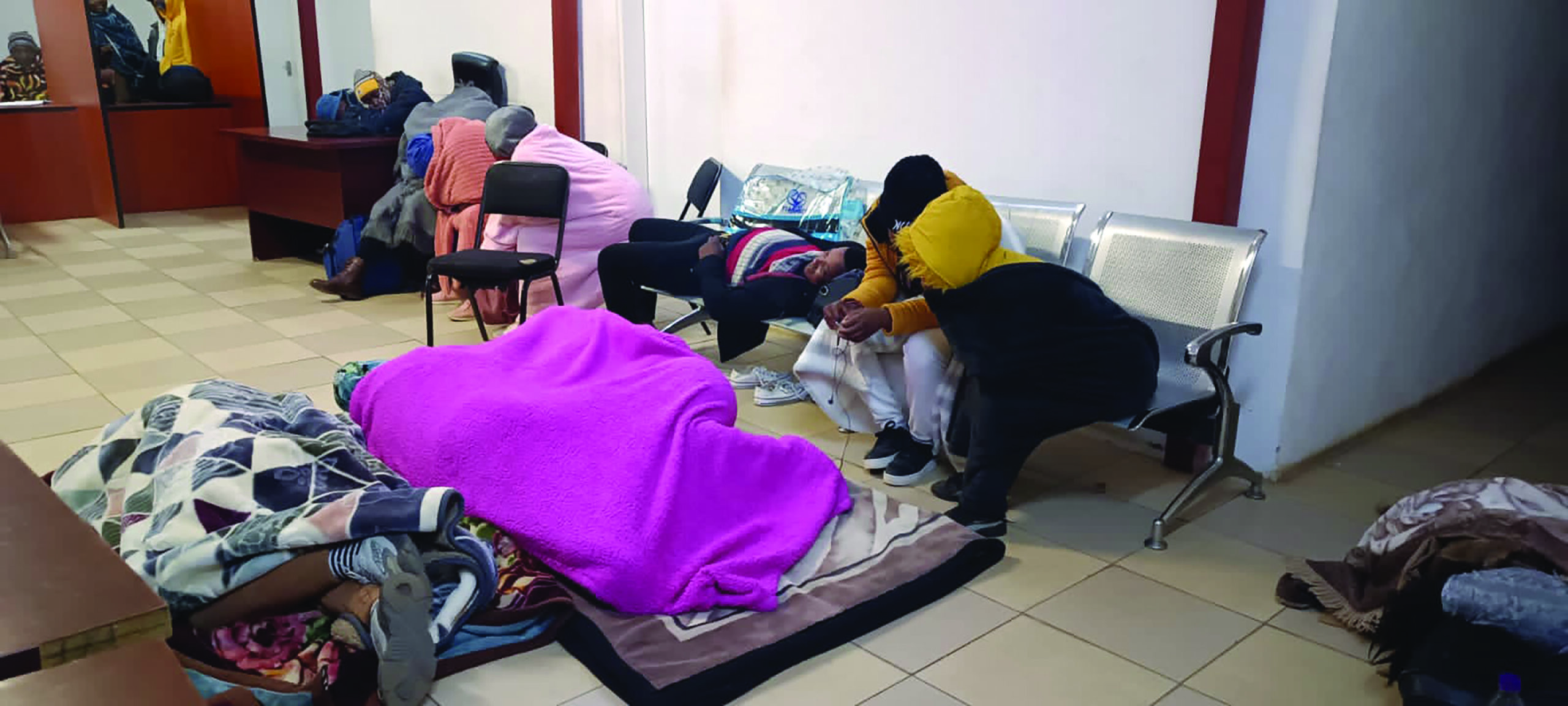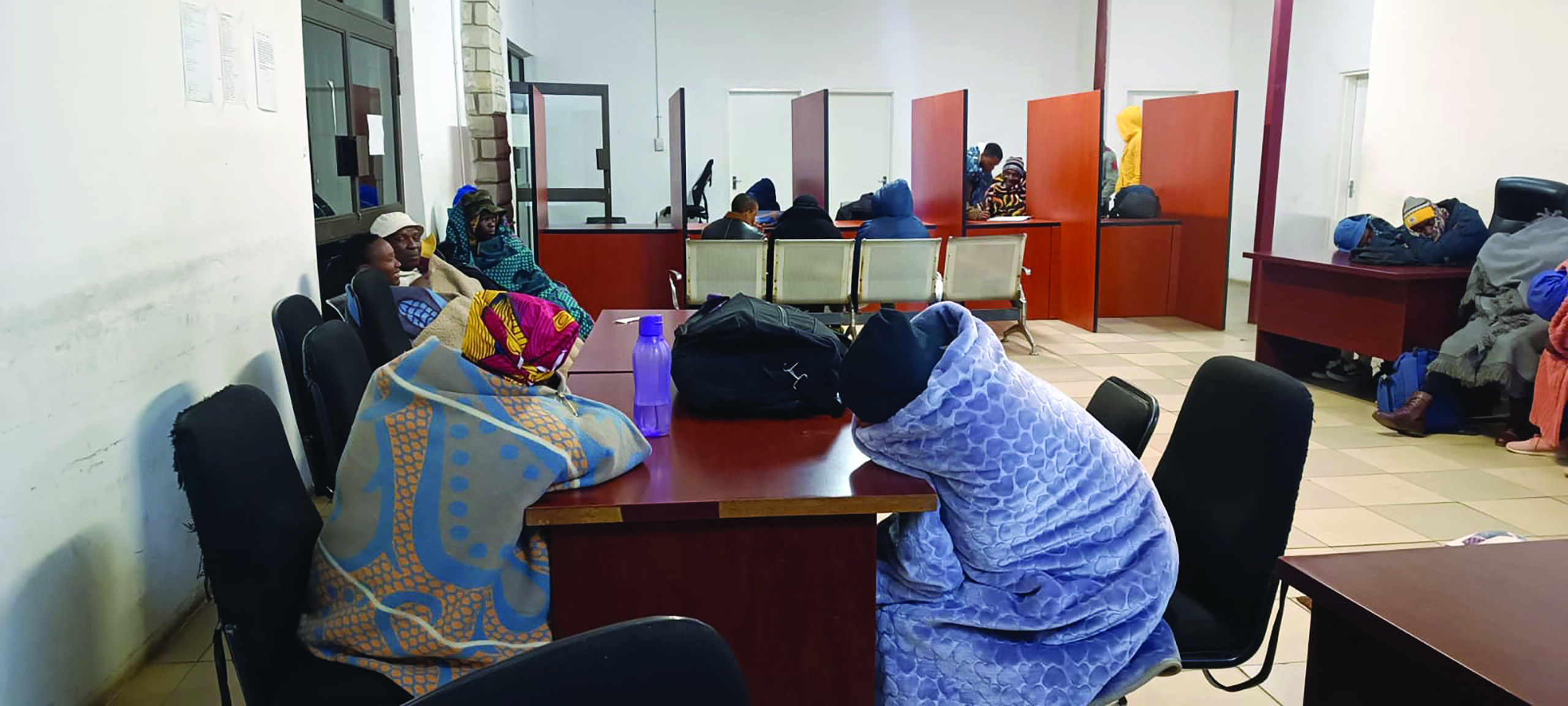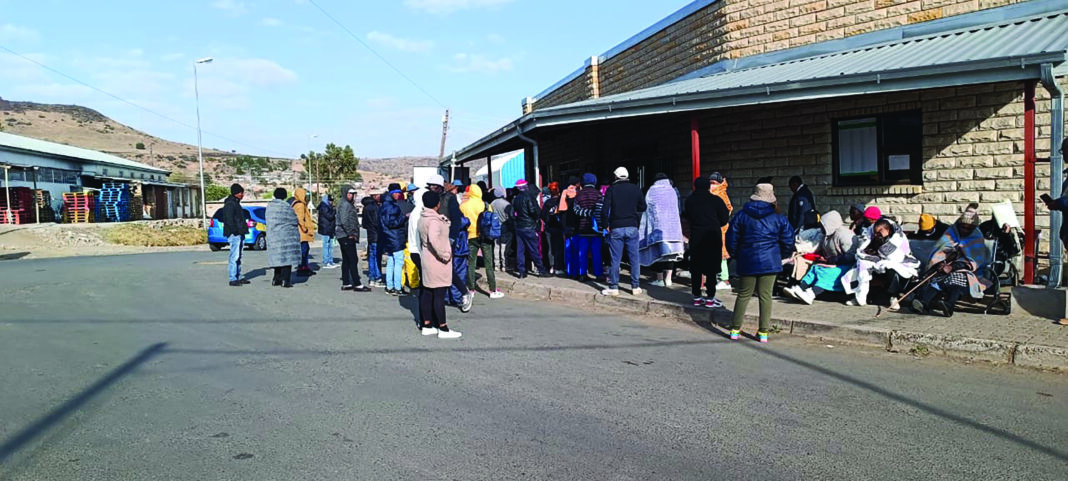…Unpaid staff demotivated
Lerato Matheka
As temperatures plummet across Lesotho, the chilling reality is not just the cold but the struggle for basic identification.
72-year-old ‘Mateboho Letšosa sits resolutely on a steel stool inside the Upper Moyeni National Identity and Civil Registration (NICR) office, her heart filled with hope yet burdened by despair.
Arriving at 4 AM on Monday, September 9, she and 108 others camped outside, anxiously waiting for their chance to renew their National Identity Documents and access other services. It is 8 PM and having spent the whole day without accessing services, she is going to brave through the night that promises to be harsh.
For many Basotho, the National ID is not merely a card; it is a lifeline, granting access to essential services like healthcare, banking, and social welfare. However, the Ministry of Local Government, Chieftainship, Home Affairs and Police failures have left countless citizens without this critical document, transforming what should be a straightforward process into a monumental struggle.
A Cold Night of Hope

‘Mateboho Letšosa’s journey to the NICR office began with confidence that her life would normalise with a renewed National ID. Yet her optimism quickly turned to dismay upon learning that the daily quota for processing applications had already been met well before 4 am.
Services begin at 7 am at the Upper Moyeni office.
“I was told the office only helps 60 people,” she said, her voice tinged with fatigue.
“By 12:30, they were done helping those 60 people, and I and some who came after me were left with no choice but to spend the whole day here.”
A smallholder farmer, Letšosa relies on her ID to receive her pension and sell livestock, however, her expired documents have hindered her income since June 2024.
“Without my ID, I struggle to access my pension or sell my animals,” she explained. As the day wore on, she was forced to ask for a blanket from a nearby village, determined not to leave without her renewed ID.
“I came here unprepared, but I won’t leave until I get my ID renewed,” she vowed.
Her story represents the broader struggle faced by many Basotho, who are subjected to sleeping outside NICR offices across the country just to register for services the following day.
The Bureaucratic Nightmare
The inefficiencies in the NICR offices due to many reasons, including staff not being paid on time, have become a source of widespread frustration.
Long waits, limited quotas, and staff shortages illustrate a ministry overwhelmed by demand.
NICR is responsible for registering births, deaths, and marriages, and issuing National Identity Cards (IDs), yet IDs have not been adequately issued due to a lack of resources.
Nkeletseng*, who just arrived from Cape Town, is another applicant facing challenges.
“I arrived this morning at 6 AM but was told they weren’t taking anymore people for the day,” she said.
With only three days off work to renew her ID and passport, she felt trapped.
“I can’t afford to spend another M2000 on transport. All I need is my ID to apply for my passport and return to work.”
Her story is echoed by many, including Nkotseng Hlanyane, who traveled from Phamong in Mohale’s Hoek to urgently renew her documents.
“My mother is being buried on Saturday, and I need an ID and passport urgently. I feel helpless because the officers told us they can’t exceed the quota regardless of how much we begged and tried to make them see reason,” she lamented.
The emotional toll is significant, with applicants feeling powerless against a bureaucratic system that seems indifferent to their needs. Nonkululeko, a nursing mother, described her own frustration:
“If I choose to stay so I can register for tomorrow, this would be my fourth attempt. I was here on Friday, and I was turned back again.”
Rights Denied
The delays in issuing National IDs raise serious human rights concerns.
Article 6 of the Universal Declaration of Human Rights states that everyone has the right to a legal identity, and Section 7(1) of Lesotho’s Constitution asserts the right to freedom of movement. Yet, as more Basotho find themselves without valid identification, these rights remain unfulfilled.
“We are being treated like we don’t exist,” said Letšosa, echoing the sentiments of many frustrated citizens. The emotional impact of being denied a fundamental aspect of identity cannot be overstated, especially when it directly affects access to essential services.
As of April 2024, over 170,000 Basotho failed to access daily services due to expired IDs. The situation worsened in May when another 179,515 ID cardholders joined their ranks, unable to renew due to a lack of cards.
Voices of the Vulnerable

Among those most affected are marginalised groups—women, the elderly, and individuals with urgent needs. The desperation is palpable as they share their stories.
“All I need is the ID and then I can bury my mother,” Nkotseng said, her voice breaking under the weight of her grief. “We just want to fulfill our family obligations.”
Litšoane Keketsi, another applicant, explained the immense pressure she faces. “I traveled from Mount Moorosi. I need to work and support my family, but I’m left waiting.” Her story underscores the emotional burden many carry as they seek basic recognition and rights.
These voices highlight the urgent need for systemic change. “We just want to live our lives with dignity,” said Letšosa, reflecting the collective frustration of those waiting for services.
Growing Desperation and Lawlessness
The growing desperation among applicants has led to chaotic scenes outside NICR offices with the applicants’ registration at the centre of it. Some individuals have resorted to desperate measures, such as paying for a spot on the registration list.
“To secure your spot, you have to pay M20,” a self-appointed list controller in Maseru admitted, showcasing the lawlessness that has emerged in the face of bureaucratic failings.
As tensions rise, the emotional strain is evident. “Every time I come here, I see others turned away like me simply because we didn’t secure a spot, and I feel like I am stuck in limbo,” Nonkululeko expressed.
The uncertainty of whether they will receive the services they need exacerbates feelings of hopelessness and frustration.
“I was told to keep the list with a set quota but these people at times demand to see owners of the registered names in person,” Rethabile Molise, a security in Quthing said.
Like Upper Moyeni, Mafeteng and Botha-Bothe lists are manned by security guards which minimises chaos unlike in Maseru where anything can happen.
“The fought over the registration list because some people had turned queuing for other a business and the fight was so bad that we and police had to intervene, that’s when the mall management chased out of the property,” the mall security recounted
The chaos reflects a broader societal issue, where individuals are forced to compete for basic rights in an increasingly desperate environment.
Systemic Failures and Accountability
Government responses have been inadequate, with Minister Lebona Lephema facing criticism for failing to resolve the ongoing crisis surrounding ID and passport issuance.
During parliamentary sessions, he reiterated the financial constraints of his ministry, yet citizens see little change on the ground.
Of the estimated 179,515 IDs expiring in 2024, many have already passed their renewal dates and his team acknowledged the severity of the situation in parliament.
They further informed that the budget allocation for the 2024-2025 fiscal year only allows for the procurement of 60,000 passports from a national need of approximately 150,000, with nothing allocated for IDs.
The frustrations of NICR staff also deserve attention.
“We do what we can, but we are not motivated without pay,” one officer confessed saying delayed salaries have created a demoralising environment, affecting service delivery.
“We will surely not go out of our way because we are definitely not motivated,” another officer echoed.
This disconnect between government promises and the reality on the ground leaves citizens feeling betrayed. “It’s as if they are turning a blind eye to our suffering,” Letšosa added, encapsulating the sentiments of many applicants who feel unheard and unseen.
The stories of individuals like ‘Mateboho Letšosa, Nkotseng Hlanyane, and Nkeletseng highlight a broader crisis that demands urgent attention. Access to basic services is a human right, yet for countless Basotho, this right remains out of reach.
As citizens continue to camp outside NICR offices, the pressing question remains: How long must they endure this struggle? The government must act swiftly to restore faith in the system and ensure that no Basotho is left behind.
Advocacy for change is essential and citizens must unite to demand accountability and transparency of the ministry just as the advocacy boding, Section 2, a local advocacy group, has condemned the violation of human rights.
Summary
- It is 8 PM and having spent the whole day without accessing services, she is going to brave through the night that promises to be harsh.
- A smallholder farmer, Letšosa relies on her ID to receive her pension and sell livestock, however, her expired documents have hindered her income since June 2024.
- As the day wore on, she was forced to ask for a blanket from a nearby village, determined not to leave without her renewed ID.

Your Trusted Source for News and Insights in Lesotho!
At Newsday Media, we are passionate about delivering accurate, timely, and engaging news and multimedia content to our diverse audience. Founded with the vision of revolutionizing the media landscape in Lesotho, we have grown into a leading hybrid media company that blends traditional journalism with innovative digital platforms.






